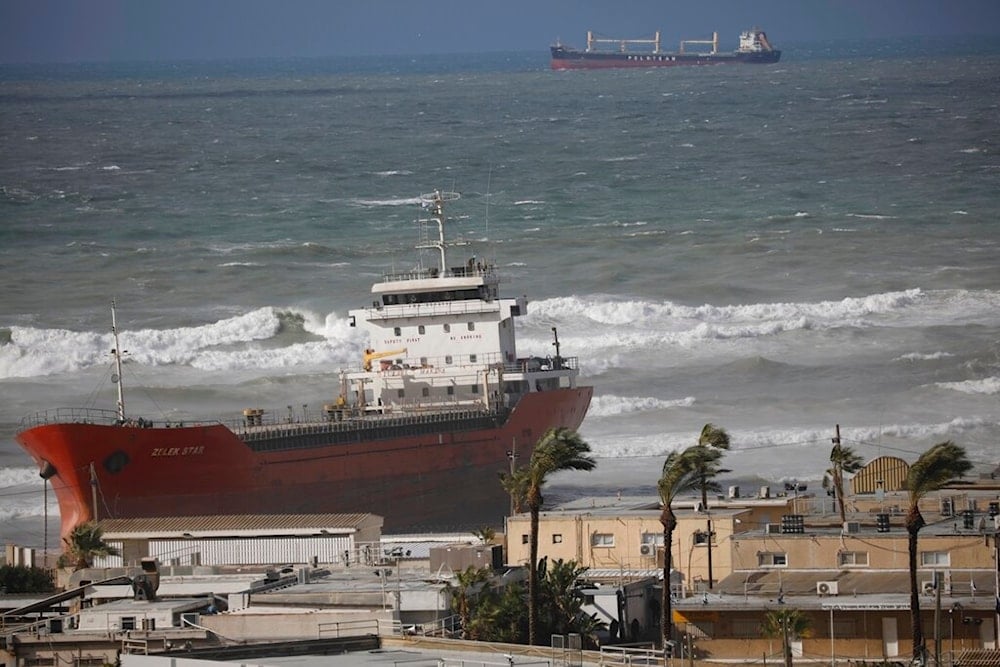Ashdod port loses 20 million shekels amid war on Gaza: Report
Between the Israeli war on Gaza and Yemen's maritime ban, the occupied port of Isdud suffers significant losses, impacting all areas of operations.
-

The Zelek Star cargo ship carrying cement is stranded in the Mediterranean Sea beach in the occupied port of Ashdod, Friday, Dec. 27, 2019 (AP)
The port of the occupied city of Isdud in Palestine has lost at least 20 million shekels worth of revenue this season, a report by Calcalist revealed, as a direct result of the Israeli genocide in Gaza.
Port losses have worsened following the damage from the war, with the primary cause being a decline across all areas of activity, particularly in the number of ships carrying vehicles and general cargo. The port allegedly anticipates a rebound in the second half of the year as some of the activity returns.
The Israeli war in Gaza and the decrease in maritime transportation volumes continue to impact the financial results of the Isdud Port. The company’s revenue for the second quarter dropped from 261 million shekels in the same period last year to 247 million shekels, a 5% decrease.
Net profit for the second quarter fell from 47 million shekels in the same period last year to 17.5 million shekels, a 63% decrease. The period ended with a loss of approximately 20 million shekels, compared to a net profit of about 30 million shekels in the second quarter of 2023.
This significant loss is even greater compared to the first quarter of this year, during which the port experienced a loss of 7 million shekels. For the first half of 2024, the port recorded a loss of 29 million shekels, compared to a profit of 71 million shekels in the same period of 2023.
Additionally, the operational loss due to other expenses in the second quarter of 2024 reached 13 million shekels. This was impacted by the ongoing war on Gaza, operational disruptions, and allocations resulting from a framework agreement for company workers, a bonus payment to employees, and a 270 million shekel payment to the Israeli occupation government, along with other allocations.
It is noteworthy that the volume of containers loaded and unloaded at the port in the first half of 2024 fell to 322,000 containers, compared to 353,000 in the same period last year, marking a 9% decrease. This decline is attributed to high interest rates, changes in maritime routes due to the Yemeni navigation ban, and a gradual shift in imports from Turkiye. The vehicle sector saw a nearly 50% drop, with approximately 39,000 vehicles unloaded in the first half of 2024 compared to about 79,000 in the same period last year.
The vehicle sector was particularly affected by changes in maritime routes, especially due to the war, and disruptions in the transit of some ships through the Suez Canal. Overall, some ships were not permitted to reach "Israel", while others offloaded cargo at ports in the Gulf and southern regions.
How Yemen's maritime ban impacted the supply chain
The closure of the Eilat port due to Yemeni operations led to shifting the supply chain to Mediterranean ports, which did not benefit Ashdod Port.
For example, the Italian Ministry of Transport advised ships arriving in occupied ports not to offload cargo south of Tel Aviv due to concerns about the war, leading to a halt in visits to Ashdod Port for several months, with significant impacts in the first quarter of the year.
In the bulk cargo sector (e.g. grains), the damage was relatively minor, around 1%, with 4,421 tons of bulk cargo unloaded in the first half of the year. The volume of general cargo in the same period decreased by 20% to 454,000 tons, particularly affecting imports of metals and timber, which are key components of general cargo.
Passenger ships have ceased coming to "Israel", but the port has indicated preparations to resume operations.
In July, Israeli newspaper Yedioth Ahronoth reported that the Port of Eilat had been nearly closed since November due to Yemeni attacks on ships in the Red Sea.
According to Ynet, the port's CEO, Gideon Golber, stated that the dire situation has left the administration with no choice but to start laying off 50 of the port's 110 employees.

 4 Min Read
4 Min Read








